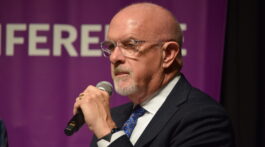by Abdul-Hakim Shabazz
Early voting starts this week in Indiana.
While I firmly believe in the right to vote, I believe more in the responsibility to cast an informed vote. This responsibility somewhat contradicts my belief, which I’ve held for quite some time, that voting is fundamentally an emotional process. People tend to vote for who they like and against who they can’t stand.
The example I use is from a decade ago. The Lovely Mrs. Shabazz wanted me to get her a purple iPod. So I got it. Why do that when a blue, green, or red one would have done the exact same thing? Easy. Purple is her favorite color, and I enjoy having peace and quiet in my home, so purple it was. Forget the “logical” fact that regardless of the color, they all did the exact same thing. My wife’s decision was basically an emotional one, much like her decision to agree to marry me.
My point is that voting, like many decisions we make, is fundamentally an emotional decision. You may hate property taxes, so you vote for the candidate who wants to eliminate them, even if they have no plan to replace the revenue. Or you may love traditional public education, which you are entitled to, but you may not be supportive of universal vouchers. You see my point.
One candidate who fully understands this is Republican Presidential nominee Donald Trump. Trump ran as an outsider, even though some of us could argue he is the ultimate insider because you don’t build skyscrapers and operate casinos and golf courses unless you know how the game is played, but I digress. However, Trump has been able to make that emotional connection with his base. He has conveyed a message that he represents them, the forgotten man; while the elites, whoever they are, get all the rewards and ship jobs overseas, the little guy or gal can’t get ahead.
Honestly, he sounds a lot like Bernie Sanders (no offense), but that’s another column for another time.
So when the anti-Trump crowd can’t quite figure out why the pro-Trump crowd supports him, I refer to the principle of Occam’s razor, that when looking for an answer, sometimes the simplest explanation is what it is. And with Trump, it’s easy: his supporters like him. It could be because they believe he stands up for them, or he is good for business, or the fact that he’s a Republican. I could make the same argument regarding Kamala Harris. Her supporters like her because she has made an emotional connection, or they can’t stand Donald Trump, and vice-versa.
There’s an old saying in politics that the candidate who usually wins is the candidate you would want to sit down and have a beer with. For me, it’s a cigar and a martini, but fundamentally, it’s likeability. Of course, in my business, I know a lot of these folks personally, and there are some I would gladly vote for, while others I wouldn’t vote for them no matter how many cigars, edibles, comic books and cheese popcorn you left at my doorstep.
So, back to my original point. I am all for the right to vote, but you should cast that vote based on informed decision-making. After looking at the issues important to you and seeing where the candidates stand, if everything lines up, I say go for it.
We’ve made it as easy as possible to vote. You have 30 days. You can vote by mail. We have vote centers where you can vote anywhere in a county. We do everything but cast your vote for you. The least a voter can do is get informed. There are plenty of non-partisan websites that can help you find out what candidates’ positions are on issues that affect your community. And here’s another thought: call the campaign. You will be surprised at how surprised they will be when a voter reaches out.
Now, go out and make the best emotionally informed decision possible.
Abdul-Hakim is the editor and publisher of Indy Politics. He is also an attorney licensed in Indiana and Illinois.












